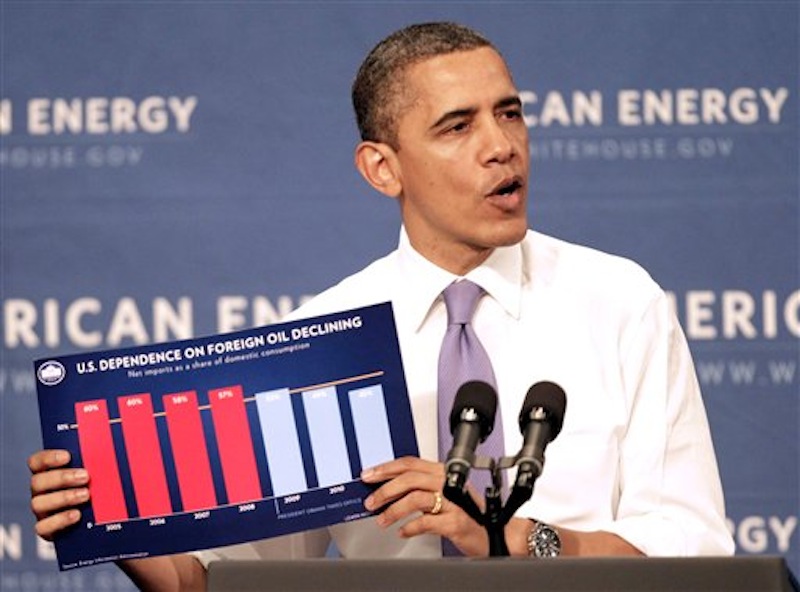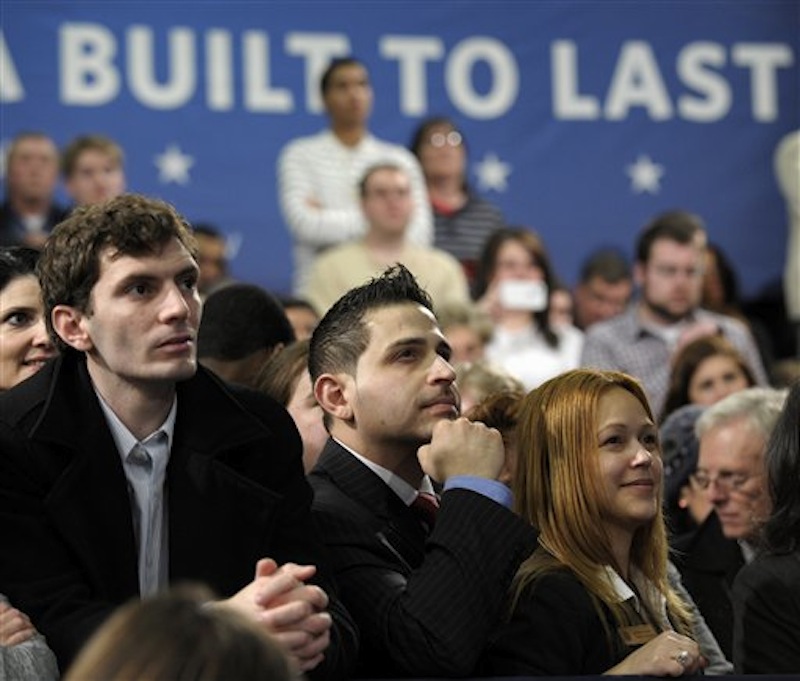NASHUA, N.H. — President Barack Obama, turning his political sights on snowy New Hampshire, demanded that Congress eliminate oil and gas company subsidies that he called an outrageous government “giveaway.” Though politically a long shot, the White House believes the idea resonates at a time of high gasoline prices.
“Let’s put every single member of Congress on record: You can stand with oil companies or you can stand up for the American people,” Obama said, reiterating an appeal he made last year as gas prices were rising.
The president also said Republican charges that his policies are driving up gas prices won’t pass “a political bull-detector” test and pointed to a chart that showed decreasing U.S. dependence on foreign oil.
His remarks came as retail gasoline prices rose Thursday to a national average of $3.74 per gallon.
Obama has repeatedly called for an end to about $4 billion in annual tax breaks and subsidies for oil and gas companies, government support that Obama has said is unwarranted at a time of burgeoning profits and rising domestic production.
“It’s outrageous. It’s inexcusable. I’m asking Congress: Eliminate this oil industry giveaway right away,” he told a crowd at Nashua Community College after touring the school’s automotive lab.
Republican presidential contenders and GOP leaders in Congress denounced Obama’s appeal for ending subsidies and called on Obama to take further steps to expand oil production in the United States.
Obama’s move was his latest and most direct appeal to Congress to act on the tax breaks, a move that is certain to get stiff Republican opposition and that failed even when Democrats controlled both Houses of Congress.
But an administration official said the White House expects Congress to soon take up a measure ending some subsidies. The official requested anonymity to avoid speaking publicly without authorization.
Later Thursday, Obama shifted his political focus to raising money for his re-election campaign, blitzing through Manhattan for four high-dollar fundraisers.
During remarks at a $5,000-per-person reception, Obama defended his foreign policy record, from drawing down the war in Iraq to ordering the raid that killed al-Qaida leader Osama bin Laden.
Ahead of his weekend speech to a major pro-Israel group and a Monday meeting with Israeli Prime Minister Benjamin Netanyahu, Obama defended his commitment to Israel’s security, particularly amid the turbulence in the Middle East and North Africa, where some long-time leaders having been pushed from power over the past year.
The sweeping changes, he said, make foreign policy in the region more complex. “It used to be easier to deal with one person who was an autocrat when it came to knowing who you could strike a deal with,” the president said.
With the region’s leadership structure changing, Obama said the U.S. would have to take into account the “politics and the attitudes of people in the region,” some of which he acknowledged were anti-Israel.
In choosing to launch his trip in New Hampshire, Obama picked a state he easily carried in 2008. He and his surrogates have paid particular attention to the state in recent months. It offers only four electoral votes in the November election, but Democrats have been eyeing New Hampshire warily following its sharp shift to the right in the 2010 midterm elections.
Criticized by Republicans for taking too much credit for increasing oil production at home, Obama made sure to credit both his administration and that of his predecessor, George W. Bush, without mentioning Bush by name. The move seemed intended on stripping away that line of criticism from his opposition.
Obama’s insistence on a congressional vote on the oil and gas subsidies came a day after he and House and Senate leaders held a luncheon meeting at the White House that House Speaker John Boehner described as encouraging and hopeful.
Senate Minority Leader Mitch McConnell said he Obama has offered nothing to show that “raising taxes on American energy production will lower gas prices and create jobs.” White House spokesman Jay Carney shot back that oil companies are making big profits and “it doesn’t make sense for the taxpayer to cushion their already very robust bottom line.”
Last year, a report by the nonpartisan Congressional Research Service that was getting renewed attention on Thursday concluded that Obama’s oil and gas proposals “may have the effect of decreasing exploration, development, and production, while increasing prices and increasing the nation’s foreign oil dependence.”
Obama went further than he has in the past in describing how the global standoff with Iran is driving up the cost of gasoline.
“The biggest thing that’s causing the price of oil to rise right now is instability in the Middle East — this time it’s Iran,” Obama said. “A lot of folks are nervous about what might happen there, so they are anticipating there might be a big disruption in terms of flow.”
Obama has previously identified tension with Iran as a main reason for rising oil prices, but this time he ad-libbed the remark about how the prospect of a reduction in the supply of oil is making the markets nervous.
The United States and its partners are trying to deter Iran from building a nuclear weapon, including with an unprecedented European embargo on Iranian oil that takes effect this summer. Iran has responded to tightening economic sanctions and the possibility of an Israeli attack with threats to block oil shipments from the Persian Gulf.
On the presidential campaign trail, GOP front-runner Mitt Romney and former House Speaker Newt Gingrich also decried Obama’s energy policies.
Send questions/comments to the editors.




Success. Please wait for the page to reload. If the page does not reload within 5 seconds, please refresh the page.
Enter your email and password to access comments.
Hi, to comment on stories you must . This profile is in addition to your subscription and website login.
Already have a commenting profile? .
Invalid username/password.
Please check your email to confirm and complete your registration.
Only subscribers are eligible to post comments. Please subscribe or login first for digital access. Here’s why.
Use the form below to reset your password. When you've submitted your account email, we will send an email with a reset code.